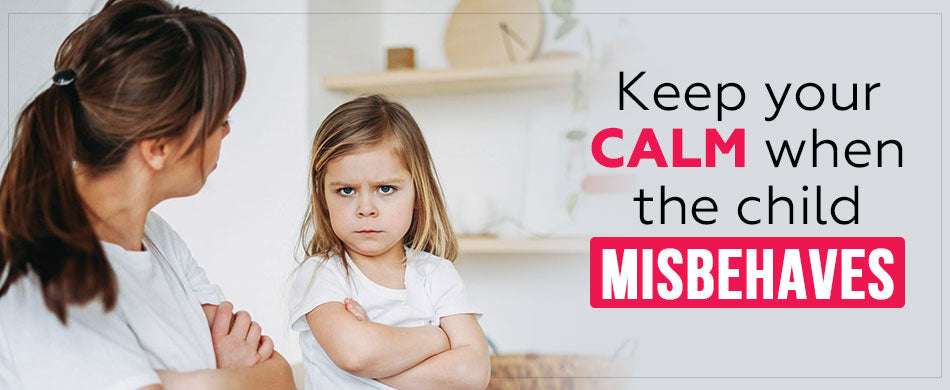
How To Keep Your Calm When The Child Misbehaves
- by Baby Organo
- 2 min 2 sec
Table of Contents
Considering all the affectionate and phenomenally joyful experiences, parenting is overall a roller coaster ride. It has highs and lows, giggles and melos. And, there comes a moment where a toddler throws tantrums in the park or can make you insane with their mess and nagging.
Nevertheless, their uncontrollable rage can also trigger your sanity and you can no longer hold your calm. Losing your calm when the child misbehaves is the most common behavior, it’s natural and normal. On the contrary and realistically, it isn’t normal to yell at your child when he’s already experiencing an explosion of emotions.
It isn’t easy to keep your calm when a child misbehaves but it is more than necessary to hold your temper. Avoid teaching your toddler when he’s throwing tantrums because it won’t make any difference at the moment but add fuel to the fire. You can later clearly communicate with the child once he becomes calm.
Get your hands on some effective techniques to keep your calm when the child misbehaves.
Ignore wisely
Seeking attention is one of the core reasons why a child misbehaves at times or repeats the actions and behavior that you’ve already refused to accept. Hence, ignore your child’s attention-seeking and annoying behavior for that moment. Ignoring the child’s misbehavior will make him feel less entertained about what the toddler is doing and he’ll eventually stop repeating such actions.
Practice mindfulness
It is exhausting to have a hard day at work and come home to witness a child’s misbehavior. However, you can still muster up the energy to deal with it by practicing mindfulness. The best way to practice mindfulness is to chill with your kid. Yes, it’s you who can uplift your kid’s mood and spirit.
Therefore, perform simple mindfulness activities with your child such as a walk in the park, exploring the garden, visiting your kid’s other favorite place or just lying on the hammock. These activities increase the bond and break the ice to communicate regarding their misbehavior.
Walk away for a moment
It is one of the proven techniques to walk away from an environment that you can’t control because you have to control yourself. So, the moment you see the child being loud, constantly nagging and bursting out, you can pause and walk out of the room for a moment to calm yourself.
Get into another room, pause for a while, take a deep breath and go back to your kid after a while. Walking away helps you not ragefully involve yourself in the matter so that you can sanely deal with the scenario.
Have an emotional check-in
It is natural to be frustrated and furious when a kid misbehaves but that’s the moment where you need to check your emotions. Instead of being aggressive with the child, you can pause for a while to get in sync with your emotions.
Just close your eyes, inhale and exhale, calm your senses and then open your eyes. The entire process of checking your emotions helps youtube in with your body and mind so that you can composedly respond to your toddler.
Empathize with your kid
Understanding your child is the key to remaining calm when he shows aggression. There are reasons why a kid behaves the way they do, they may be going through some issues or triggers that explode their emotions in the form of anger.
Set aside your frustration and sit with your child to know what is bothering him, ask questions politely and convince him that you know what he's going through and you are with him in whatever way can make the kid feel good.
Ask for support
At times it is imperative to seek support from someone when it becomes difficult to handle your child’s tantrums. If you have a partner then you both can support each other to calm down when the going gets messy with the toddler. If one loses control, the other can help to regain the peace or may take the charge to collectively deal with the situation.
Solve the problem
Give the kid some time and space and communicate with him when he’s in a good state to talk. Address the problem to your child regarding his misbehavior and also involve everyone in the conversation.
Ask your child for ideas to solve the problem or discuss the ways you can solve this issue together. Involving your child in the problem-solving process helps them to realize their misbehavior and helps to not repeat the same.
Yelling is a good way to release your frustration but yelling at the already disturbed child is never a solution. It may harm or refrain the kid from approaching you for their problems. So, it demands a lot of patience and peace to deal with the child’s misbehavior. Hence, ensure to take care of yourself and hold your calm in the chaos to handle the situation wisely.
- Tags:
- Parenting tips

